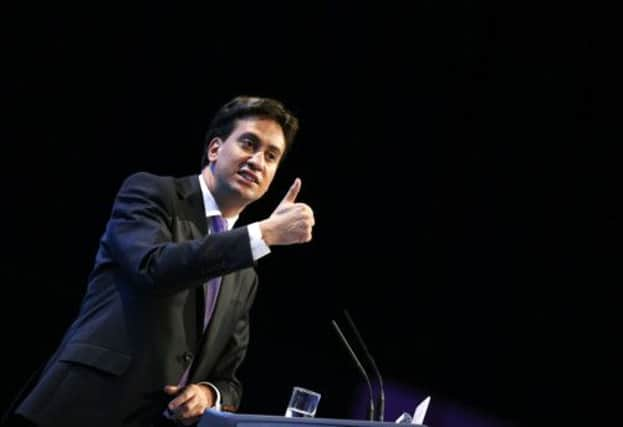Euan McColm: Miliband must make Tories feel heat


When Iain Duncan Smith’s leadership of the Conservative Party was racing towards its inevitable, messy conclusion, he gambled on trying to turn his failings to his advantage.
The plan went catastrophically wrong. Duncan Smith was ridiculed for his warning to critics, in a speech to his party conference in 2002, that they should not underestimate the power of a quiet man. His pathos-sodden insistence that the quiet man was staying in charge, and turning up the volume, convinced nobody. Next time he spoke in Westminster, Labour MPs shushed him. And, before we knew it, Michael Howard was leading the Tories.
Advertisement
Hide AdAdvertisement
Hide AdThere were dangerous echoes of Duncan Smith’s speech as Ed Miliband addressed his party conference in Brighton last week.
The Labour leader began by mocking his reputation as something of a geek with a story about how he’d helped a woman who’d fallen from her bike and been described by her as an “action hero”. It was an awkward routine (full of knowing “what’s so funnies?”) which may have demonstrated that Miliband possesses – or, at least, recognises the appeal of – a sense of humour, but also reminded us that he has still to overcome the dweeb-factor that chips at his credibility as a prospective Prime Minister. An hour later, the leader of the opposition walked off-stage having delivered a slick, notes-free speech that seemed, genuinely, to have thrilled the room (although I think we might take with a pinch of salt the claim from one breathless member of the House of Lords that it was the greatest he’d heard from a leader of his party).
The biggest hit with his audience was a promise that gas and electricity bills would not go up for 20 months if he wins the 2015 General Election. This would mean, Miliband said, that families would save, on average, £120, while businesses would save £1,800.
Unsurprisingly – and not unhelpfully – energy companies reacted furiously to Miliband’s proposal. There was talk that an enforced price limit would “freeze the jobs and livelihoods” of 600,000-plus people. Not only that, warned Lib Dem Energy Secretary Edward Davey, there was the risk of blackouts, too.
There was nothing especially problematic, there. Few voters will be moved by the complaints of companies that make multi-billion-pound profits, after all, and a drop, after the speech, of almost £1 billion in energy companies’ share prices may have seemed a welcome bloody nose.
But the proposal did not solely provoke the ire of the industry. Miliband found himself dealing with criticism from within his own party. Former business secretary Lord Mandelson – a key figure in the New Labour project – said Miliband’s pledge could wreck the industrial policy the party had developed under Tony Blair’s leadership. Miliband’s speech, said Mandelson, risked the perception of Labour policy moving back in time.
There remain questions over how exactly Miliband might carry through his threat to limit the charging powers of these companies, but to the ears of those in the conference hall, this was music: Labour was on the side of “ordinary people” not, like Tories, on the side of insatiable profiteers.
That CBI director-general John Cridland said the Labour conference had caused a setback for Labour’s “pro-enterprise credentials” re-enforced the idea that Prime Minister Miliband would be in thrall to none of the usual grasping suspects.
Advertisement
Hide AdAdvertisement
Hide AdThere was more in the speech to demonstrate Miliband’s morally driven willingness to challenge the wealthy. It was Labour, not the Tories, he said, that had stood up to media baron Rupert Murdoch. It was a claim undermined by the reality that he waited until Murdoch was already on the floor – over phone hacking – before putting in the boot. That was undoubtedly entertaining for a great many people (across political lines) but it was hardly evidence of the sort of fearlessness that Miliband was suggesting.
Cynics may have been reminded of Miliband’s recent opposition to military action in Syria, which still looks as much like a piece of opportunistic posturing as it might appear a principled stance.
Once the obligatory ovation has petered out, there were left some in Labour who felt the speech spoke most clearly to the already decided, to the 30-some per cent who solidly support the party (and to the hand-wringers in the hall who always found New Labour an uncomfortable proposition).
Speculation now shifts to a reshuffle of Miliband’s shadow cabinet. A long overdue rule change means that where once Labour members had a vote on who made the front bench while the party was in opposition, Miliband is free to sack and promote as he wishes.
That’s unlikely to be good news for Blairites – such as shadow health secretary Andy Burnham and defence spokesman Jim Murphy – whose association with a past from which Miliband is keen to distance himself may mean their careers grind to a halt under the current regime.
The Labour leader may share some of the presentational problems that undermined Duncan Smith’s leadership of the Tories but his party is in far better shape. Polling figures suggest that Miliband might still emerge as head of the largest party after the 2015 election.
But, if he’s to hold on to that (small) advantage, Miliband must turn up the volume against the Tories. In Brighton, he shouted loudest about the ways in which his Labour Party differs from Tony Blair’s. «
Twitter: @euanmccolm